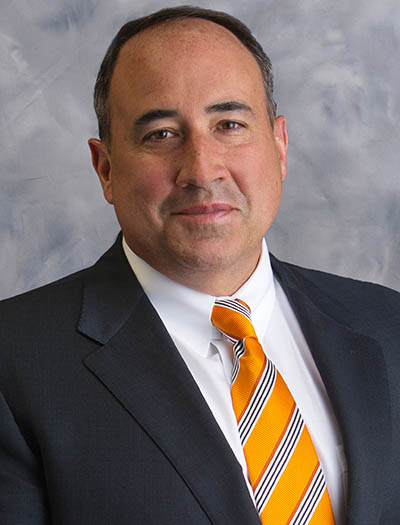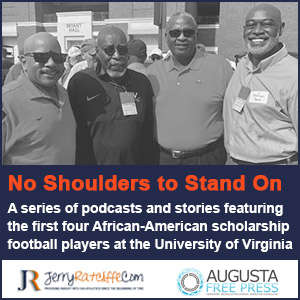Meeting Next Week Could Be Pivotal To Future Of Virginia Football
One of the most important gatherings in Virginia football history will take place a week from tonight at Farmington Country Club in Charlottesville.

Charles McDaniel, one of the greatest linebackers in Cavalier history, is sponsoring a very exclusive event of heavy hitters, the types of UVa boosters that can help change the course of Wahoo football. The event’s focus is to start the financial support for Virginia’s new football support building and an overall athletic complex that will shape the future.
“Chris Long is speaking – Chris is playing that Thursday night [Philadelphia Eagles] – so he’s coming back down for the Friday night event,” McDaniel said. “Carla Williams (UVa’s athletics director) is speaking, UVa president Jim Ryan is speaking, and Tony Bennett is speaking. It’s going to be a nice event.”
UVa’s Board of Visitors approved a $180 million athletics master plan last month, which includes a new women’s softball complex, the demolition of University Hall and two supporting buildings, construction of new practice fields, a new state-of-the-art football home that will include coaches offices, meeting rooms, weight room, training rooms, locker rooms, players lounge, and much more. That building will also be tied to a new athletic complex that will house Olympic sports and administrative offices.
One of the first things UVa football coach Bronco Mendenhall said when he was introduced to Wahoo Nation three years ago was that the program needs a new football building. He was echoing the thoughts of his last three predecessors, George Welsh, Al Groh, and Mike London.
Welsh, the Hall of Famer, said as recently as two years ago that “Virginia is behind” the rest of the ACC in terms of a football building, something he fully supports. In fact, Welsh elaborated that had UVa not built the Frank McCue Center when it did, his program would not have advanced the way it did.
Coaches explain that in the never ending recruiting war for football talent, particularly in the state, such football homes are necessary to gain an edge.
“This will be the first of probably many such events, and its purpose is to get people fired up about what we need to do,” said McDaniel, a former All-ACC star for Welsh, and UVa’s all-time leading tackler until Micah Kiser and Quin Blanding came along.
McDaniel is presently president and CEO of Hilldrup, one of the top moving companies on the East Coast.
“This is going to be a very impressive athletic complex and football building,” McDaniel said. “Is it going to be the best in the country? No. Will is likely be top 10 to 15? Heck yeah.
“And you can recruit to it,” McDaniel said. “The kids will deserve it. We have been inadequate in some of our facilities, and the people who don’t think that don’t know how athletic programs are run and the importance of facilities.”
McDaniel’s building has done a lot of work with UVa in moving many of the Olympic sports teams out of U-Hall and into trailers behind The Cage, where those programs are temporarily housed until those buildings come down and the new facility is constructed.
Yes, many of UVa’s athletic programs are operating out of trailers, just like Welsh’s football program was run out of trailers behind U-Hall back in the day before McCue was built.
“I was so excited they were moving people out of University Hall,” McDaniel said. “That building served a wonderful purpose, and there are great memories, but it has to come down, along with those other buildings, in order to build what we need to build.
“I think it’s really exciting for all programs because not only has football not kept up with the Joneses, those other programs, well, it’s just embarrassing to see where field hockey is housed. It’s embarrassing to see where the track program is.
“Baseball has a great facility, basketball has a great facility, and golf, but after that, I wouldn’t put any in the great category, and many [programs] are in the average to less-than-acceptable categories,” McDaniel said. “It’s amazing that those sports have done as well as they have, but no longer can we accept those living conditions.”
The Hilldrup exec has been part of UVa athletics since the early 1980s, has served with the VAF and other boards around athletics and the university, so he has good reference points to his words.
“We wouldn’t accept those conditions anywhere else in this university, and what Virginia alumni and supporters need to understand is we would not accept that in any other school at UVa,” McDaniel said. “Not the commerce school, not arts and sciences, not at the business school, not the law school. We just wouldn’t accept that.
“Nor could you recruit or get people to come to that, and we’ve got this vision that we’re one of the best schools in the country – which I happen to think we are – and yet we accept mediocrity with facilities for athletics, and it’s no longer acceptable,” McDaniel said.
He hopes Virginia supporters will embrace the message that Williams and Ryan and others will deliver next Friday night (Oct. 12), and understand the importance of their request. There needs to be the same high standard in athletics that the university demands elsewhere.
“Everybody’s got to have the courage to step up and do right by these student-athletes,” McDaniel said. “We’ve got to get serious with this, we’ve got to raise the money, the school’s going to support it, and it’s going to get done.
“We can start telling recruits next year that this is real, here are the plans, and you’ll be playing in it, practicing in it,” McDaniel said.
McDaniel went on to explain what happened at Virginia Tech when former coach Frank Beamer turned that football program into one of the top football programs in the country, how that put the university on the map and helped promote pride and support for the entire school.
“With that comes fundraising, with that comes support for the school, with that comes more students applying to school,” McDaniel said. “With that comes more students applying to school. What’s better than having people come back in the fall to Charlottesville to see a winning football program?
“You can’t have a half-empty stadium,” McDaniel said. “Today, you see it every day, there are a lot of stadiums that aren’t full, whether it’s professional or college. You can watch these damn games of your phone, you can watch them on your laptop, on TV, and it’s a pain in the ass to go to these places. It ain’t easy to get to Blacksburg, so you’re not going to fill it if you don’t have a good winning program. We’re struggling to fill 65,000. We need to win and get people back in those seats.”
McDaniel loves his school and he wants to see the football program return to the glory of the Welsh years, when Virginia football was viewed as one of the nation’s most consistent winning programs.
Those of us who lived through those years, the mid-1980s to the late 1990s, remember the thrill of football weekends, particularly in 1990 when the Cavaliers rose to the nation’s No. 1 ranking for three weeks. We remember Moore-to-Moore, ending Clemson’s and Florida State’s winning streaks, and all the glory and national buzz surroundings those events.
McDaniel, and many others, want current generation Wahoos to experience those thrills once again.
That’s why Oct. 12 is one of the most important gatherings in Wahoo gridiron history. Courage is the word.








